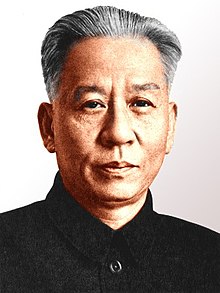
Back ليو شاوتشي Arabic ليو شاوتشى ARZ Liu Shaoqi AST Liu Shaoqi Aymara Лю Шаацы Byelorussian Liu Shaoqi Catalan Liou Šao-čchi Czech Liu Shaoqi German Liu Shaoqi Esperanto Liu Shaoqi Spanish
You can help expand this article with text translated from the corresponding article in Chinese. (March 2023) Click [show] for important translation instructions.
|
Liu Shaoqi | |
|---|---|
刘少奇 | |
 | |
| 2nd Chairman of the People's Republic of China | |
| In office 27 April 1959 – 31 October 1968 | |
| Premier | Zhou Enlai |
| Vice President | Dong Biwu and Soong Ching-ling |
| Leader | Mao Zedong (Chairman of the Chinese Communist Party) |
| Preceded by | Mao Zedong |
| Succeeded by | Dong Biwu and Soong Ching-ling (acting) |
| 1st Chairman of the Standing Committee of the National People's Congress | |
| In office 15 September 1954 – 28 April 1959 | |
| Preceded by | Position established |
| Succeeded by | Zhu De |
| Vice Chairman of the Chinese Communist Party | |
| In office 28 September 1956 – 1 August 1966 | |
| Chairman | Mao Zedong |
| Preceded by | Position established |
| Succeeded by | Lin Biao |
| Delegate to the National People's Congress | |
| In office 15 September 1954 – 21 October 1968 | |
| Constituency | Beijing At-large |
| Personal details | |
| Born | 24 November 1898 Ningxiang, Hunan, Qing dynasty |
| Died | 12 November 1969 (aged 70) Kaifeng, Henan, People’s Republic of China |
| Political party | Chinese Communist Party (1921–1968) |
| Spouses |
|
| Children | 9 (including Liu Yunbin and Liu Yuan) |
| Liu Shaoqi | |||||||||||||||||
|---|---|---|---|---|---|---|---|---|---|---|---|---|---|---|---|---|---|
| Simplified Chinese | 刘少奇 | ||||||||||||||||
| Traditional Chinese | 劉少奇 | ||||||||||||||||
| |||||||||||||||||
Liu Shaoqi (pronounced [ljǒʊ ʂâʊtɕʰǐ]; 24 November 1898 – 12 November 1969) was a Chinese revolutionary and politician. He was the chairman of the Standing Committee of the National People's Congress from 1954 to 1959, first-ranking vice chairman of the Chinese Communist Party from 1956 to 1966, and the chairman of the People's Republic of China, the head of state from 1959 to 1968. He was considered to be a possible successor to Mao Zedong, but was purged during the Cultural Revolution.
In his early years, Liu participated in labor movements in strikes, including the May Thirtieth Movement. After the Chinese Civil War began in 1927, he was assigned by the CCP to work in Shanghai and Northeast China, and travelled to the Jiangxi Soviet in 1932. He participated in the Long March, and was appointed as the Party Secretary in North China in 1936 to lead anti-Japanese resistance efforts in the area. During the Second Sino-Japanese War, Liu led the CCP's Central Plains Bureau. After the New Fourth Army incident in 1941, Liu became a political commissar of the New Fourth Army. After Liu returned to Yan'an in 1943, he became a secretary of the CCP Secretariat and a vice chairman of the Central Military Commission.
After the proclamation of the People's Republic of China in 1949. Liu became a vice chairman of the Central People's Government. After the establishment of the National People's Congress in 1954, Liu was elected as the chairman of its Standing Committee. In 1959, he succeeded Mao Zedong as the chairman of the People's Republic of China. During his chairmanship, he implemented policies of economic reconstruction in China, especially after the Seven Thousand Cadres Conference in 1962. Liu was publicly named as Mao's chosen successor in 1961. However, he was criticized and then purged by Mao soon after the beginning of the Cultural Revolution in 1966, eventually being arrested and imprisoned in 1967. He was forced out of public life and was labelled the "commander of China's bourgeoisie headquarters", China's foremost "capitalist-roader", and a traitor to the revolution. He died in prison in 1969 due to complications from diabetes. Liu was widely condemned in the years following his death until he was posthumously rehabilitated by Deng Xiaoping's government in 1980, as part of the Boluan Fanzheng period. Deng's government granted Liu a national memorial service.
© MMXXIII Rich X Search. We shall prevail. All rights reserved. Rich X Search